Blackmores' Sustainability Through CSR
VerifiedAdded on 2020/04/01
|7
|2251
|651
AI Summary
This assignment analyzes the role of corporate social responsibility (CSR) in driving sustainability at Blackmores. It explores how CSR initiatives benefit both the organization and its stakeholders, including employees. The research highlights how effective implementation of CSR contributes to Blackmores' success by aligning business practices with ethical and sustainable values.
Contribute Materials
Your contribution can guide someone’s learning journey. Share your
documents today.
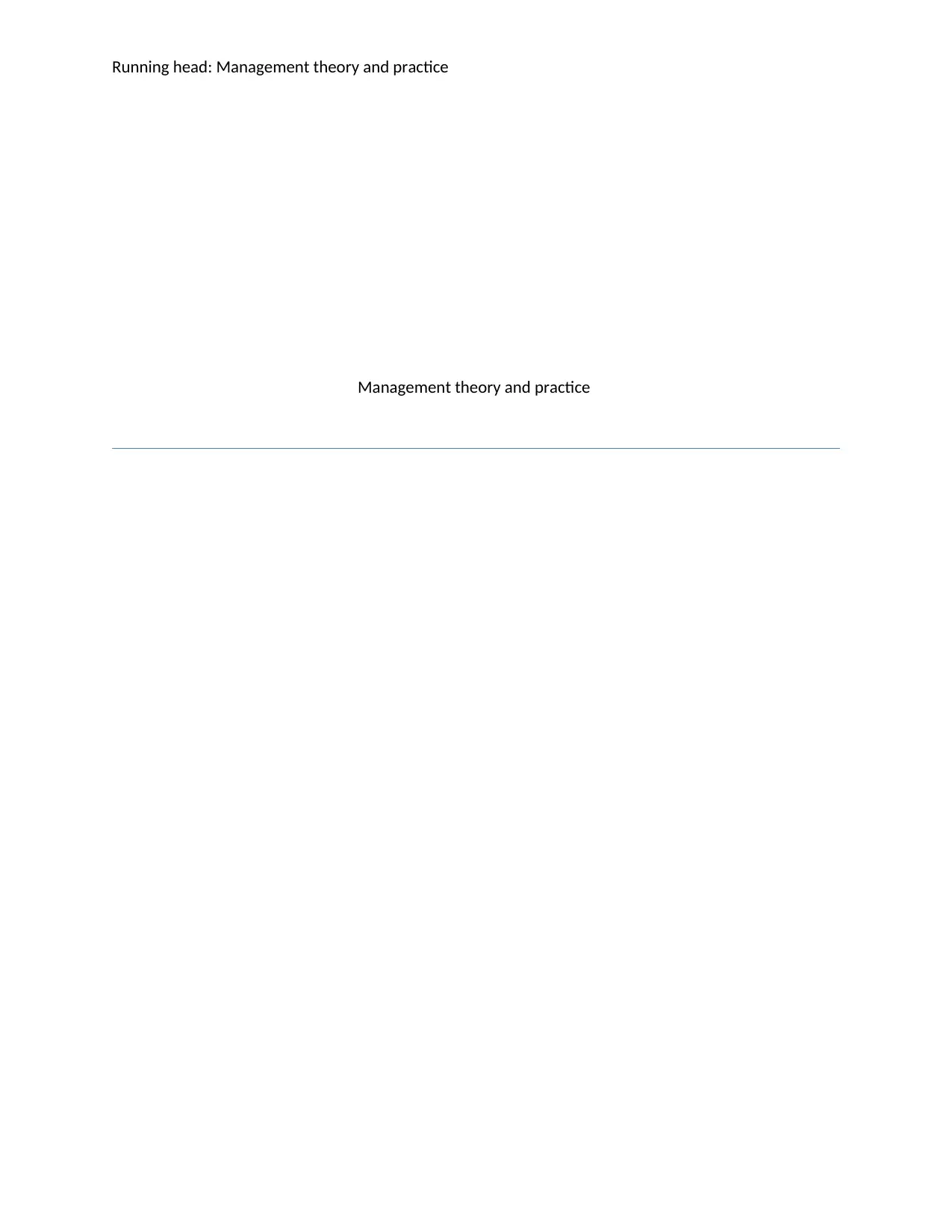
Running head: Management theory and practice
Management theory and practice
Management theory and practice
Secure Best Marks with AI Grader
Need help grading? Try our AI Grader for instant feedback on your assignments.
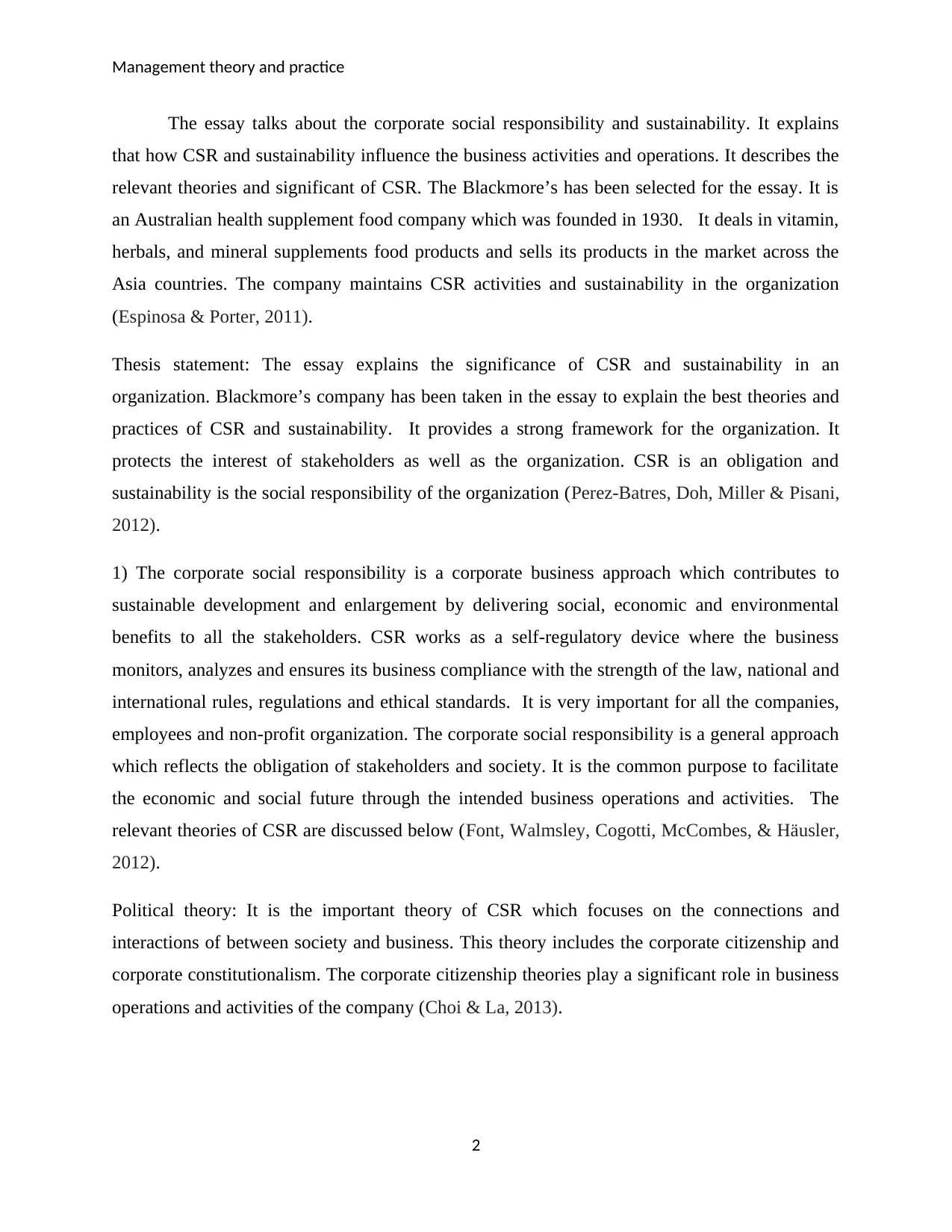
Management theory and practice
The essay talks about the corporate social responsibility and sustainability. It explains
that how CSR and sustainability influence the business activities and operations. It describes the
relevant theories and significant of CSR. The Blackmore’s has been selected for the essay. It is
an Australian health supplement food company which was founded in 1930. It deals in vitamin,
herbals, and mineral supplements food products and sells its products in the market across the
Asia countries. The company maintains CSR activities and sustainability in the organization
(Espinosa & Porter, 2011).
Thesis statement: The essay explains the significance of CSR and sustainability in an
organization. Blackmore’s company has been taken in the essay to explain the best theories and
practices of CSR and sustainability. It provides a strong framework for the organization. It
protects the interest of stakeholders as well as the organization. CSR is an obligation and
sustainability is the social responsibility of the organization (Perez-Batres, Doh, Miller & Pisani,
2012).
1) The corporate social responsibility is a corporate business approach which contributes to
sustainable development and enlargement by delivering social, economic and environmental
benefits to all the stakeholders. CSR works as a self-regulatory device where the business
monitors, analyzes and ensures its business compliance with the strength of the law, national and
international rules, regulations and ethical standards. It is very important for all the companies,
employees and non-profit organization. The corporate social responsibility is a general approach
which reflects the obligation of stakeholders and society. It is the common purpose to facilitate
the economic and social future through the intended business operations and activities. The
relevant theories of CSR are discussed below (Font, Walmsley, Cogotti, McCombes, & Häusler,
2012).
Political theory: It is the important theory of CSR which focuses on the connections and
interactions of between society and business. This theory includes the corporate citizenship and
corporate constitutionalism. The corporate citizenship theories play a significant role in business
operations and activities of the company (Choi & La, 2013).
2
The essay talks about the corporate social responsibility and sustainability. It explains
that how CSR and sustainability influence the business activities and operations. It describes the
relevant theories and significant of CSR. The Blackmore’s has been selected for the essay. It is
an Australian health supplement food company which was founded in 1930. It deals in vitamin,
herbals, and mineral supplements food products and sells its products in the market across the
Asia countries. The company maintains CSR activities and sustainability in the organization
(Espinosa & Porter, 2011).
Thesis statement: The essay explains the significance of CSR and sustainability in an
organization. Blackmore’s company has been taken in the essay to explain the best theories and
practices of CSR and sustainability. It provides a strong framework for the organization. It
protects the interest of stakeholders as well as the organization. CSR is an obligation and
sustainability is the social responsibility of the organization (Perez-Batres, Doh, Miller & Pisani,
2012).
1) The corporate social responsibility is a corporate business approach which contributes to
sustainable development and enlargement by delivering social, economic and environmental
benefits to all the stakeholders. CSR works as a self-regulatory device where the business
monitors, analyzes and ensures its business compliance with the strength of the law, national and
international rules, regulations and ethical standards. It is very important for all the companies,
employees and non-profit organization. The corporate social responsibility is a general approach
which reflects the obligation of stakeholders and society. It is the common purpose to facilitate
the economic and social future through the intended business operations and activities. The
relevant theories of CSR are discussed below (Font, Walmsley, Cogotti, McCombes, & Häusler,
2012).
Political theory: It is the important theory of CSR which focuses on the connections and
interactions of between society and business. This theory includes the corporate citizenship and
corporate constitutionalism. The corporate citizenship theories play a significant role in business
operations and activities of the company (Choi & La, 2013).
2
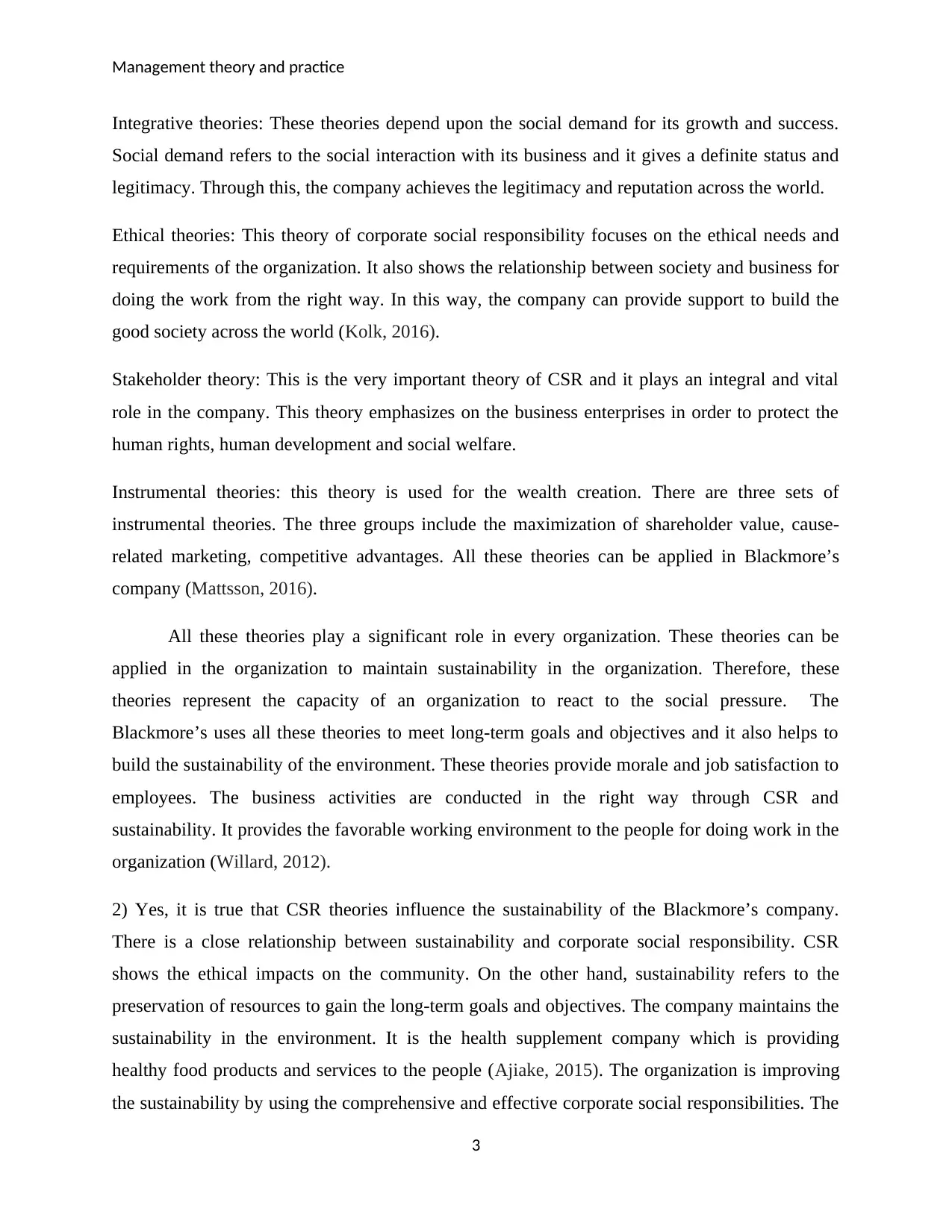
Management theory and practice
Integrative theories: These theories depend upon the social demand for its growth and success.
Social demand refers to the social interaction with its business and it gives a definite status and
legitimacy. Through this, the company achieves the legitimacy and reputation across the world.
Ethical theories: This theory of corporate social responsibility focuses on the ethical needs and
requirements of the organization. It also shows the relationship between society and business for
doing the work from the right way. In this way, the company can provide support to build the
good society across the world (Kolk, 2016).
Stakeholder theory: This is the very important theory of CSR and it plays an integral and vital
role in the company. This theory emphasizes on the business enterprises in order to protect the
human rights, human development and social welfare.
Instrumental theories: this theory is used for the wealth creation. There are three sets of
instrumental theories. The three groups include the maximization of shareholder value, cause-
related marketing, competitive advantages. All these theories can be applied in Blackmore’s
company (Mattsson, 2016).
All these theories play a significant role in every organization. These theories can be
applied in the organization to maintain sustainability in the organization. Therefore, these
theories represent the capacity of an organization to react to the social pressure. The
Blackmore’s uses all these theories to meet long-term goals and objectives and it also helps to
build the sustainability of the environment. These theories provide morale and job satisfaction to
employees. The business activities are conducted in the right way through CSR and
sustainability. It provides the favorable working environment to the people for doing work in the
organization (Willard, 2012).
2) Yes, it is true that CSR theories influence the sustainability of the Blackmore’s company.
There is a close relationship between sustainability and corporate social responsibility. CSR
shows the ethical impacts on the community. On the other hand, sustainability refers to the
preservation of resources to gain the long-term goals and objectives. The company maintains the
sustainability in the environment. It is the health supplement company which is providing
healthy food products and services to the people (Ajiake, 2015). The organization is improving
the sustainability by using the comprehensive and effective corporate social responsibilities. The
3
Integrative theories: These theories depend upon the social demand for its growth and success.
Social demand refers to the social interaction with its business and it gives a definite status and
legitimacy. Through this, the company achieves the legitimacy and reputation across the world.
Ethical theories: This theory of corporate social responsibility focuses on the ethical needs and
requirements of the organization. It also shows the relationship between society and business for
doing the work from the right way. In this way, the company can provide support to build the
good society across the world (Kolk, 2016).
Stakeholder theory: This is the very important theory of CSR and it plays an integral and vital
role in the company. This theory emphasizes on the business enterprises in order to protect the
human rights, human development and social welfare.
Instrumental theories: this theory is used for the wealth creation. There are three sets of
instrumental theories. The three groups include the maximization of shareholder value, cause-
related marketing, competitive advantages. All these theories can be applied in Blackmore’s
company (Mattsson, 2016).
All these theories play a significant role in every organization. These theories can be
applied in the organization to maintain sustainability in the organization. Therefore, these
theories represent the capacity of an organization to react to the social pressure. The
Blackmore’s uses all these theories to meet long-term goals and objectives and it also helps to
build the sustainability of the environment. These theories provide morale and job satisfaction to
employees. The business activities are conducted in the right way through CSR and
sustainability. It provides the favorable working environment to the people for doing work in the
organization (Willard, 2012).
2) Yes, it is true that CSR theories influence the sustainability of the Blackmore’s company.
There is a close relationship between sustainability and corporate social responsibility. CSR
shows the ethical impacts on the community. On the other hand, sustainability refers to the
preservation of resources to gain the long-term goals and objectives. The company maintains the
sustainability in the environment. It is the health supplement company which is providing
healthy food products and services to the people (Ajiake, 2015). The organization is improving
the sustainability by using the comprehensive and effective corporate social responsibilities. The
3
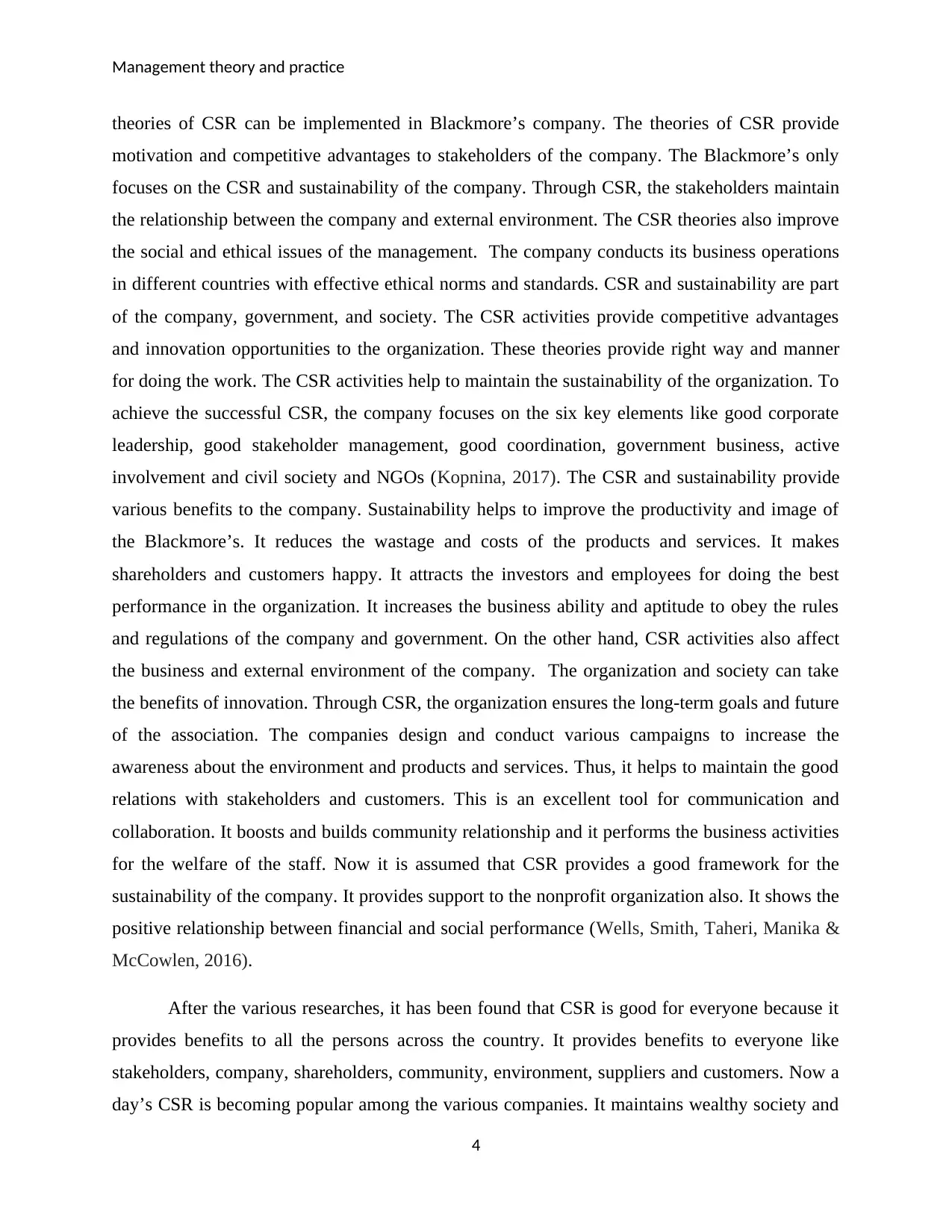
Management theory and practice
theories of CSR can be implemented in Blackmore’s company. The theories of CSR provide
motivation and competitive advantages to stakeholders of the company. The Blackmore’s only
focuses on the CSR and sustainability of the company. Through CSR, the stakeholders maintain
the relationship between the company and external environment. The CSR theories also improve
the social and ethical issues of the management. The company conducts its business operations
in different countries with effective ethical norms and standards. CSR and sustainability are part
of the company, government, and society. The CSR activities provide competitive advantages
and innovation opportunities to the organization. These theories provide right way and manner
for doing the work. The CSR activities help to maintain the sustainability of the organization. To
achieve the successful CSR, the company focuses on the six key elements like good corporate
leadership, good stakeholder management, good coordination, government business, active
involvement and civil society and NGOs (Kopnina, 2017). The CSR and sustainability provide
various benefits to the company. Sustainability helps to improve the productivity and image of
the Blackmore’s. It reduces the wastage and costs of the products and services. It makes
shareholders and customers happy. It attracts the investors and employees for doing the best
performance in the organization. It increases the business ability and aptitude to obey the rules
and regulations of the company and government. On the other hand, CSR activities also affect
the business and external environment of the company. The organization and society can take
the benefits of innovation. Through CSR, the organization ensures the long-term goals and future
of the association. The companies design and conduct various campaigns to increase the
awareness about the environment and products and services. Thus, it helps to maintain the good
relations with stakeholders and customers. This is an excellent tool for communication and
collaboration. It boosts and builds community relationship and it performs the business activities
for the welfare of the staff. Now it is assumed that CSR provides a good framework for the
sustainability of the company. It provides support to the nonprofit organization also. It shows the
positive relationship between financial and social performance (Wells, Smith, Taheri, Manika &
McCowlen, 2016).
After the various researches, it has been found that CSR is good for everyone because it
provides benefits to all the persons across the country. It provides benefits to everyone like
stakeholders, company, shareholders, community, environment, suppliers and customers. Now a
day’s CSR is becoming popular among the various companies. It maintains wealthy society and
4
theories of CSR can be implemented in Blackmore’s company. The theories of CSR provide
motivation and competitive advantages to stakeholders of the company. The Blackmore’s only
focuses on the CSR and sustainability of the company. Through CSR, the stakeholders maintain
the relationship between the company and external environment. The CSR theories also improve
the social and ethical issues of the management. The company conducts its business operations
in different countries with effective ethical norms and standards. CSR and sustainability are part
of the company, government, and society. The CSR activities provide competitive advantages
and innovation opportunities to the organization. These theories provide right way and manner
for doing the work. The CSR activities help to maintain the sustainability of the organization. To
achieve the successful CSR, the company focuses on the six key elements like good corporate
leadership, good stakeholder management, good coordination, government business, active
involvement and civil society and NGOs (Kopnina, 2017). The CSR and sustainability provide
various benefits to the company. Sustainability helps to improve the productivity and image of
the Blackmore’s. It reduces the wastage and costs of the products and services. It makes
shareholders and customers happy. It attracts the investors and employees for doing the best
performance in the organization. It increases the business ability and aptitude to obey the rules
and regulations of the company and government. On the other hand, CSR activities also affect
the business and external environment of the company. The organization and society can take
the benefits of innovation. Through CSR, the organization ensures the long-term goals and future
of the association. The companies design and conduct various campaigns to increase the
awareness about the environment and products and services. Thus, it helps to maintain the good
relations with stakeholders and customers. This is an excellent tool for communication and
collaboration. It boosts and builds community relationship and it performs the business activities
for the welfare of the staff. Now it is assumed that CSR provides a good framework for the
sustainability of the company. It provides support to the nonprofit organization also. It shows the
positive relationship between financial and social performance (Wells, Smith, Taheri, Manika &
McCowlen, 2016).
After the various researches, it has been found that CSR is good for everyone because it
provides benefits to all the persons across the country. It provides benefits to everyone like
stakeholders, company, shareholders, community, environment, suppliers and customers. Now a
day’s CSR is becoming popular among the various companies. It maintains wealthy society and
4
Secure Best Marks with AI Grader
Need help grading? Try our AI Grader for instant feedback on your assignments.
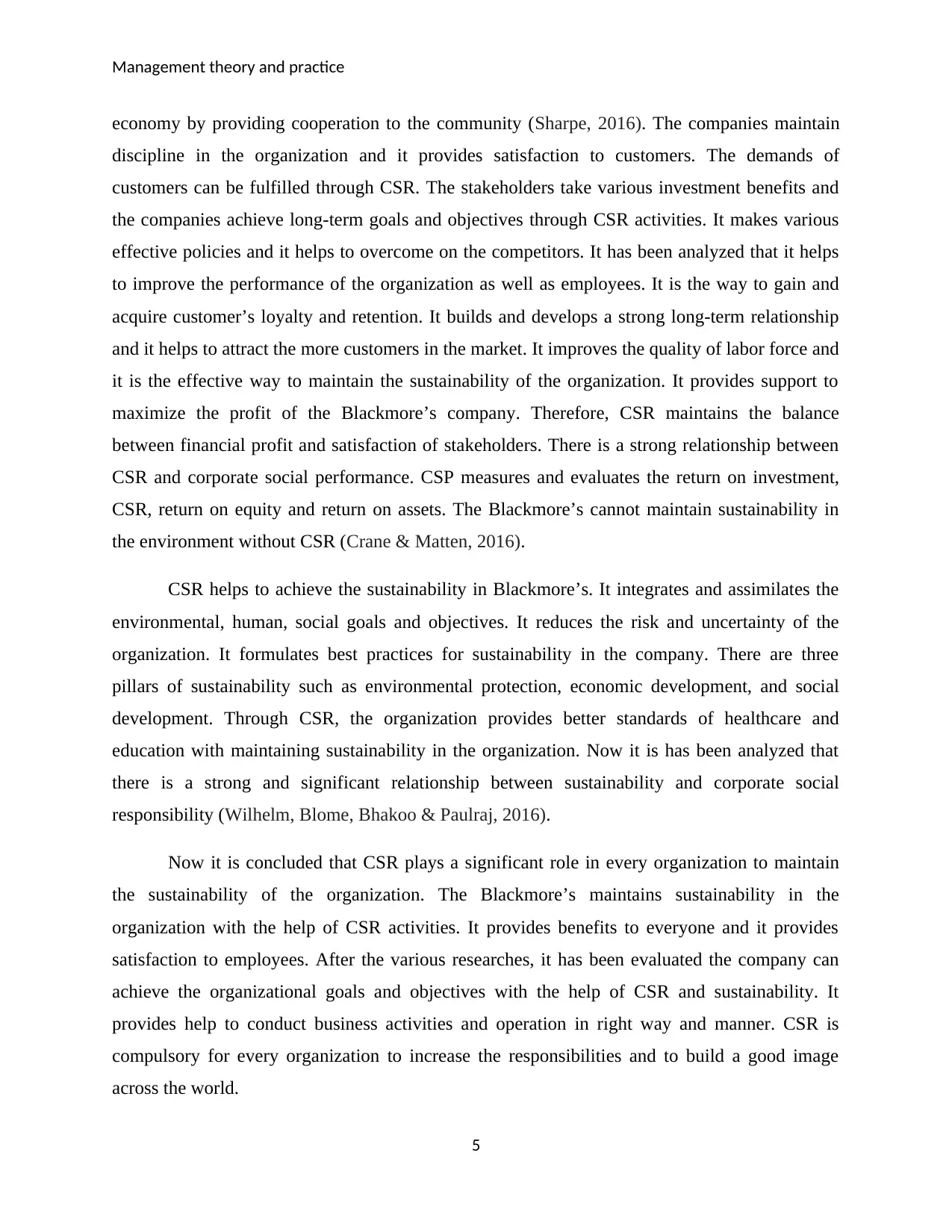
Management theory and practice
economy by providing cooperation to the community (Sharpe, 2016). The companies maintain
discipline in the organization and it provides satisfaction to customers. The demands of
customers can be fulfilled through CSR. The stakeholders take various investment benefits and
the companies achieve long-term goals and objectives through CSR activities. It makes various
effective policies and it helps to overcome on the competitors. It has been analyzed that it helps
to improve the performance of the organization as well as employees. It is the way to gain and
acquire customer’s loyalty and retention. It builds and develops a strong long-term relationship
and it helps to attract the more customers in the market. It improves the quality of labor force and
it is the effective way to maintain the sustainability of the organization. It provides support to
maximize the profit of the Blackmore’s company. Therefore, CSR maintains the balance
between financial profit and satisfaction of stakeholders. There is a strong relationship between
CSR and corporate social performance. CSP measures and evaluates the return on investment,
CSR, return on equity and return on assets. The Blackmore’s cannot maintain sustainability in
the environment without CSR (Crane & Matten, 2016).
CSR helps to achieve the sustainability in Blackmore’s. It integrates and assimilates the
environmental, human, social goals and objectives. It reduces the risk and uncertainty of the
organization. It formulates best practices for sustainability in the company. There are three
pillars of sustainability such as environmental protection, economic development, and social
development. Through CSR, the organization provides better standards of healthcare and
education with maintaining sustainability in the organization. Now it is has been analyzed that
there is a strong and significant relationship between sustainability and corporate social
responsibility (Wilhelm, Blome, Bhakoo & Paulraj, 2016).
Now it is concluded that CSR plays a significant role in every organization to maintain
the sustainability of the organization. The Blackmore’s maintains sustainability in the
organization with the help of CSR activities. It provides benefits to everyone and it provides
satisfaction to employees. After the various researches, it has been evaluated the company can
achieve the organizational goals and objectives with the help of CSR and sustainability. It
provides help to conduct business activities and operation in right way and manner. CSR is
compulsory for every organization to increase the responsibilities and to build a good image
across the world.
5
economy by providing cooperation to the community (Sharpe, 2016). The companies maintain
discipline in the organization and it provides satisfaction to customers. The demands of
customers can be fulfilled through CSR. The stakeholders take various investment benefits and
the companies achieve long-term goals and objectives through CSR activities. It makes various
effective policies and it helps to overcome on the competitors. It has been analyzed that it helps
to improve the performance of the organization as well as employees. It is the way to gain and
acquire customer’s loyalty and retention. It builds and develops a strong long-term relationship
and it helps to attract the more customers in the market. It improves the quality of labor force and
it is the effective way to maintain the sustainability of the organization. It provides support to
maximize the profit of the Blackmore’s company. Therefore, CSR maintains the balance
between financial profit and satisfaction of stakeholders. There is a strong relationship between
CSR and corporate social performance. CSP measures and evaluates the return on investment,
CSR, return on equity and return on assets. The Blackmore’s cannot maintain sustainability in
the environment without CSR (Crane & Matten, 2016).
CSR helps to achieve the sustainability in Blackmore’s. It integrates and assimilates the
environmental, human, social goals and objectives. It reduces the risk and uncertainty of the
organization. It formulates best practices for sustainability in the company. There are three
pillars of sustainability such as environmental protection, economic development, and social
development. Through CSR, the organization provides better standards of healthcare and
education with maintaining sustainability in the organization. Now it is has been analyzed that
there is a strong and significant relationship between sustainability and corporate social
responsibility (Wilhelm, Blome, Bhakoo & Paulraj, 2016).
Now it is concluded that CSR plays a significant role in every organization to maintain
the sustainability of the organization. The Blackmore’s maintains sustainability in the
organization with the help of CSR activities. It provides benefits to everyone and it provides
satisfaction to employees. After the various researches, it has been evaluated the company can
achieve the organizational goals and objectives with the help of CSR and sustainability. It
provides help to conduct business activities and operation in right way and manner. CSR is
compulsory for every organization to increase the responsibilities and to build a good image
across the world.
5
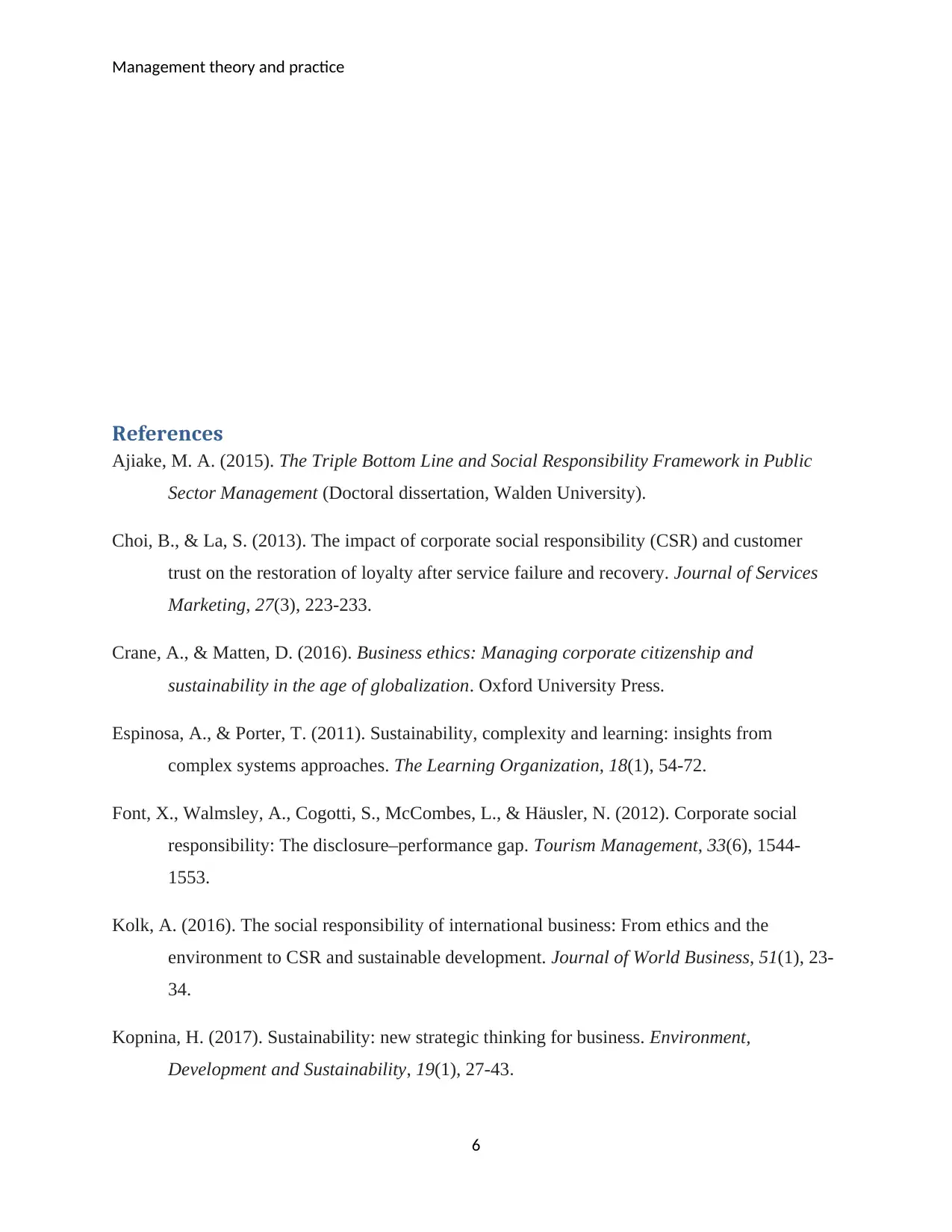
Management theory and practice
References
Ajiake, M. A. (2015). The Triple Bottom Line and Social Responsibility Framework in Public
Sector Management (Doctoral dissertation, Walden University).
Choi, B., & La, S. (2013). The impact of corporate social responsibility (CSR) and customer
trust on the restoration of loyalty after service failure and recovery. Journal of Services
Marketing, 27(3), 223-233.
Crane, A., & Matten, D. (2016). Business ethics: Managing corporate citizenship and
sustainability in the age of globalization. Oxford University Press.
Espinosa, A., & Porter, T. (2011). Sustainability, complexity and learning: insights from
complex systems approaches. The Learning Organization, 18(1), 54-72.
Font, X., Walmsley, A., Cogotti, S., McCombes, L., & Häusler, N. (2012). Corporate social
responsibility: The disclosure–performance gap. Tourism Management, 33(6), 1544-
1553.
Kolk, A. (2016). The social responsibility of international business: From ethics and the
environment to CSR and sustainable development. Journal of World Business, 51(1), 23-
34.
Kopnina, H. (2017). Sustainability: new strategic thinking for business. Environment,
Development and Sustainability, 19(1), 27-43.
6
References
Ajiake, M. A. (2015). The Triple Bottom Line and Social Responsibility Framework in Public
Sector Management (Doctoral dissertation, Walden University).
Choi, B., & La, S. (2013). The impact of corporate social responsibility (CSR) and customer
trust on the restoration of loyalty after service failure and recovery. Journal of Services
Marketing, 27(3), 223-233.
Crane, A., & Matten, D. (2016). Business ethics: Managing corporate citizenship and
sustainability in the age of globalization. Oxford University Press.
Espinosa, A., & Porter, T. (2011). Sustainability, complexity and learning: insights from
complex systems approaches. The Learning Organization, 18(1), 54-72.
Font, X., Walmsley, A., Cogotti, S., McCombes, L., & Häusler, N. (2012). Corporate social
responsibility: The disclosure–performance gap. Tourism Management, 33(6), 1544-
1553.
Kolk, A. (2016). The social responsibility of international business: From ethics and the
environment to CSR and sustainable development. Journal of World Business, 51(1), 23-
34.
Kopnina, H. (2017). Sustainability: new strategic thinking for business. Environment,
Development and Sustainability, 19(1), 27-43.
6
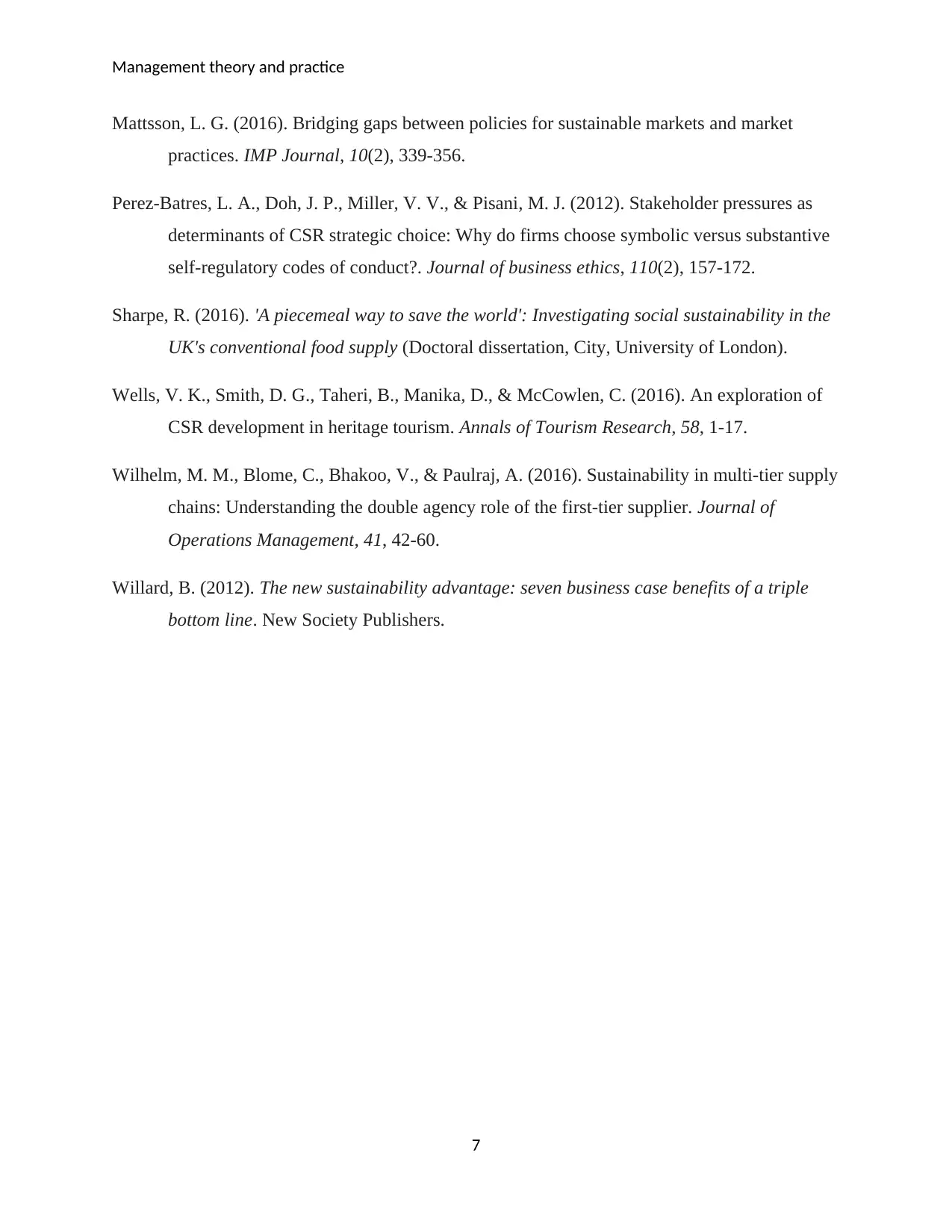
Management theory and practice
Mattsson, L. G. (2016). Bridging gaps between policies for sustainable markets and market
practices. IMP Journal, 10(2), 339-356.
Perez-Batres, L. A., Doh, J. P., Miller, V. V., & Pisani, M. J. (2012). Stakeholder pressures as
determinants of CSR strategic choice: Why do firms choose symbolic versus substantive
self-regulatory codes of conduct?. Journal of business ethics, 110(2), 157-172.
Sharpe, R. (2016). 'A piecemeal way to save the world': Investigating social sustainability in the
UK's conventional food supply (Doctoral dissertation, City, University of London).
Wells, V. K., Smith, D. G., Taheri, B., Manika, D., & McCowlen, C. (2016). An exploration of
CSR development in heritage tourism. Annals of Tourism Research, 58, 1-17.
Wilhelm, M. M., Blome, C., Bhakoo, V., & Paulraj, A. (2016). Sustainability in multi-tier supply
chains: Understanding the double agency role of the first-tier supplier. Journal of
Operations Management, 41, 42-60.
Willard, B. (2012). The new sustainability advantage: seven business case benefits of a triple
bottom line. New Society Publishers.
7
Mattsson, L. G. (2016). Bridging gaps between policies for sustainable markets and market
practices. IMP Journal, 10(2), 339-356.
Perez-Batres, L. A., Doh, J. P., Miller, V. V., & Pisani, M. J. (2012). Stakeholder pressures as
determinants of CSR strategic choice: Why do firms choose symbolic versus substantive
self-regulatory codes of conduct?. Journal of business ethics, 110(2), 157-172.
Sharpe, R. (2016). 'A piecemeal way to save the world': Investigating social sustainability in the
UK's conventional food supply (Doctoral dissertation, City, University of London).
Wells, V. K., Smith, D. G., Taheri, B., Manika, D., & McCowlen, C. (2016). An exploration of
CSR development in heritage tourism. Annals of Tourism Research, 58, 1-17.
Wilhelm, M. M., Blome, C., Bhakoo, V., & Paulraj, A. (2016). Sustainability in multi-tier supply
chains: Understanding the double agency role of the first-tier supplier. Journal of
Operations Management, 41, 42-60.
Willard, B. (2012). The new sustainability advantage: seven business case benefits of a triple
bottom line. New Society Publishers.
7
1 out of 7
Related Documents
Your All-in-One AI-Powered Toolkit for Academic Success.
+13062052269
info@desklib.com
Available 24*7 on WhatsApp / Email
![[object Object]](/_next/static/media/star-bottom.7253800d.svg)
Unlock your academic potential
© 2024 | Zucol Services PVT LTD | All rights reserved.





